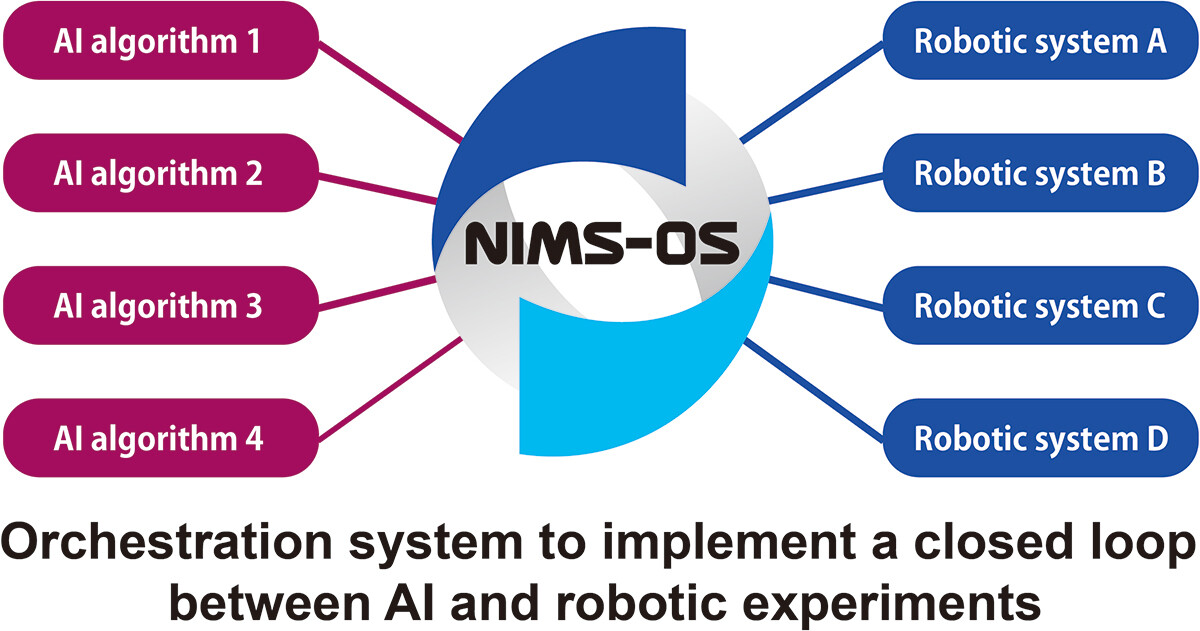Difference between revisions of "Template:Article of the week"
Shawndouglas (talk | contribs) (Updated article of the week text) |
Shawndouglas (talk | contribs) (Updated article of the week text) |
||
| Line 1: | Line 1: | ||
<div style="float: left; margin: 0.5em 0.9em 0.4em 0em;">[[File:Fig1 | <div style="float: left; margin: 0.5em 0.9em 0.4em 0em;">[[File:Fig1 Tamura SciTechAdvMatMeth2023 3-1.jpeg|240px]]</div> | ||
'''"[[Journal: | '''"[[Journal:NIMS-OS: An automation software to implement a closed loop between artificial intelligence and robotic experiments in materials science|NIMS-OS: An automation software to implement a closed loop between artificial intelligence and robotic experiments in materials science]]"''' | ||
NIMS-OS (NIMS Orchestration System) is a [[Python (programming language)|Python]] library created to realize a closed loop of [[Laboratory automation|robotic]] experiments and [[artificial intelligence]] (AI) without human intervention for automated [[Materials science|materials exploration]]. It uses various combinations of modules to operate autonomously. Each module acts as an AI for materials exploration or a controller for a robotic experiments. As AI techniques, Optimization Tools for PHYSics Based on Bayesian Optimization (PHYSBO), BoundLess Objective-free eXploration (BLOX), phase diagram construction (PDC), and random exploration (RE) methods can be used. Moreover, a system called NIMS Automated Robotic Electrochemical Experiments (NAREE) is available as a set of robotic experimental equipment ... ('''[[Journal:NIMS-OS: An automation software to implement a closed loop between artificial intelligence and robotic experiments in materials science|Full article...]]''')<br /> | |||
''Recently featured'': | ''Recently featured'': | ||
{{flowlist | | {{flowlist | | ||
* [[Journal:Establishing reliable research data management by integrating measurement devices utilizing intelligent digital twins|Establishing reliable research data management by integrating measurement devices utilizing intelligent digital twins]] | |||
* [[Journal:Autonomous experimental systems in materials science|Autonomous experimental systems in materials science]] | * [[Journal:Autonomous experimental systems in materials science|Autonomous experimental systems in materials science]] | ||
* [[Journal:Transforming healthcare analytics with FHIR: A framework for standardizing and analyzing clinical data|Transforming healthcare analytics with FHIR: A framework for standardizing and analyzing clinical data]] | * [[Journal:Transforming healthcare analytics with FHIR: A framework for standardizing and analyzing clinical data|Transforming healthcare analytics with FHIR: A framework for standardizing and analyzing clinical data]] | ||
}} | }} | ||
Revision as of 16:32, 11 December 2023
NIMS-OS (NIMS Orchestration System) is a Python library created to realize a closed loop of robotic experiments and artificial intelligence (AI) without human intervention for automated materials exploration. It uses various combinations of modules to operate autonomously. Each module acts as an AI for materials exploration or a controller for a robotic experiments. As AI techniques, Optimization Tools for PHYSics Based on Bayesian Optimization (PHYSBO), BoundLess Objective-free eXploration (BLOX), phase diagram construction (PDC), and random exploration (RE) methods can be used. Moreover, a system called NIMS Automated Robotic Electrochemical Experiments (NAREE) is available as a set of robotic experimental equipment ... (Full article...)
Recently featured:










